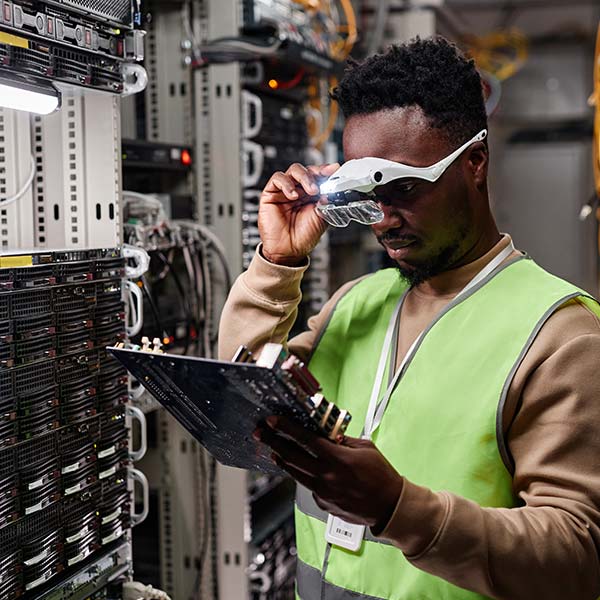BSc Electrical & Electronics Engineering
March 5, 2025 2026-01-08 14:18Bachelor of Science in Electrical and Electronics Engineering
Be Ready for an Electrifying Future!
Did you know “the first practical application of electricity was the telegraph, invented by Samuel F.B. Morse in 1837?”
Did you know “the need for electrical engineers was not felt until the invention of the telephone (1876) by Alexander Graham Bell and of the incandescent lamp (1878) by Thomas A. Edison?”
Since the post–World War II era, Electrical and Electronics Engineering has evolved into a broad, interdisciplinary field that integrates electronics, telecommunications, computer science and engineering, robotics, aerospace engineering, biomedical engineering, and artificial intelligence. Currently, active research areas include applied electromagnetics, biomedical engineering, power and energy systems, signal and image processing, wireless communications, and unmanned systems. Definitely, the field is set to direct the future of industry.
BSc Electrical and Electronics Engineering at ACity
The Bachelor of Science in Electrical and Electronics Engineering at ACity immerses students in a rigorous technical discipline centered on the study, design, and application of electrical, electronic, and electromagnetic systems. From devices and equipment to large-scale systems, students learn to harness these technologies to develop innovative, real-world solutions. Our program is designed to produce versatile graduates who seamlessly integrate theoretical knowledge with hands-on practical skills, enabling them to tackle contemporary and complex challenges in the field of electrical and electronics engineering.
Top Careers in Electrical and Electronics Engineering
Electrical and Electronics Engineering opens the door to a diverse range of career pathways across multiple industries. Whether in telecommunications, energy, healthcare, or emerging technologies, graduates can find rewarding roles that match their interests and strengths. Some leading career options in the field include:
- Computer Hardware Engineer
- Aerospace Engineer
- Systems Analyst
- Biomedical Engineer
- Electrical Engineer
Entry Requirements
Minimum C6 in 6 subjects including 3 core subjects (English, Mathematics, Integrated/General Science) and 3 elective subjects. (Physics, Elective Mathematics + Chemistry OR any other elective relevant to the chosen Program)
Minimum D or a pass in 6 subjects including 3 core subjects (English, Mathematics, Integrated/General Science) and 3 elective subjects. (Physics, Elective Mathematics + Chemistry OR any other elective relevant to the chosen Program)
Minimum of 5 credit passes in the IGCSE/O-Levels (Mathematics and English mandatory) and 3 passes in the A-Levels. (Elective/Add/Further Mathematics and Physics mandatory).
Minimum of 5 credit passes in the IGCSE/O-Levels (Mathematics and English mandatory) and a minimum score of 4 points in 3 Higher Level (HL) subjects. (Elective/Add/Further Mathematics and Physics mandatory)
Minimum of 50% overall average pass. (subject to approval NAB) Mathematics, English and Physics mandatory
Minimum GPA of 3.0 (Mathematics, English and Physics mandatory)

Electives
Renewable Energy Systems
- Smart Grid
- Solid State Electronic Devices
- Energy Management for a Sustainable Future
- Green Electronics
Radio Frequency (RF) and Microwave Circuits Design
- Microwave Engineering
- Radio Frequency (RF)
- Circuits Design
- Optoelectronic Devices
- VLSI Design
Intelligent Systems: Robotics and Mechatronics
- Advanced Control Systems
- Industrial Automation and Robotics
- Artificial Intelligence and Robotics
- Modeling and Analysis of Mechatronic Systems
Intelligent Systems: Controls and Automation
- Advanced Control Systems
- Computer Architecture and Organisation
- Artificial Intelligence and Robotics
- Modeling and Analysis of Mechatronic Systems
Mechanical Design
- Advanced CAD and CAM
- Design of Machine Elements
- Design of Jigs, Fixtures and Tools
- Modelling and Analysis of Mechatronic Systems
Power Systems Engineering
- Advanced Power Generation, Transmission and Distribution
- Power System Operation and Control Electric Power Systems Analysis and Design
- Power System Protection and Switchgear
Biomedical Engineering
- Biomedical Instrumentation
- Biomedical Signal Analysis
- Real-Time Digital Signal Processing
- Wireless Networks
Course Outline
- Communication Skills
- French Language
- Fundamentals of Innovation and Entrepreneurship (FIE) Seminar I
- Introduction to Engineering
- Introduction to Programming with Python
- Physical Sciences
- Pre-Calculus (with MATLAB)
- Technology and Society
- Analytic Geometry and Calculus I (with MATLAB)
- Engineering Mechanics
Fundamentals of Innovation and Entrepreneurship (FIE) Seminar II - Introduction to Multidisciplinary Design
- Logic and Critical Thinking
- Programming in C
- Sensors, Measurements and Instrumentation
- Text and Meaning
- Analytic Geometry and Calculus II (with MATLAB)
- Circuit Theory
- Electrical Energy Conversion and Green Electronics
- Electromagnetic Fields and Waves Theory
- Fundamentals of Innovation and Entrepreneurship (FIE) I
- Introduction to Material Science and Engineering
- Leadership Seminar I
- African Studies
- Applied Linear Algebra (with MATLAB)
- Electrical Machines
- Fundamentals of Innovation and Entrepreneurship (FIE) II
- Introduction to Contemporary Electric Power Systems
- Probability, Statistics and Reliability (with MATLAB)
- Differential Equations(with MATLAB)
- Digital Systems Design
- Leadership Seminar II
- Microelectronics
- Numerical Methods(with MATLAB)
- Power Electronics
- Signals and Systems
- Systems Dynamics
- Automatic Control Systems
- Electric Power Generation, Transmission and Distribution
- Embedded Systems
- Industry Internship
- Mechatronics
- Principles of Communication Systems
- Project Management, Engineering Economics and Risk Analysis
- Engineering Thermodynamics
- Probabilistic Systems Analysis and Applied Probability
- Project Phase I
- Technical Elective – I
- Technical Elective – II
- Environmental Science and Engineering
- Professional Ethics and Values
- Project Phase II
- Technical Elective – III
- Technical Elective – IV
Why ACity
- Home to students from over 23 countries across africa
- Houses a digital makerspace and a technology & Entrepreneurial center for creative freedom & innovation
- A fully digitized campus with the fattest internet speed in a ghanaian university
- Experienced Faculty with industry experience. Student-to-faculty ratio 5:1
- 70% practical lessons
- Every ACitizen has the opportunity to do a work placement every vacation



